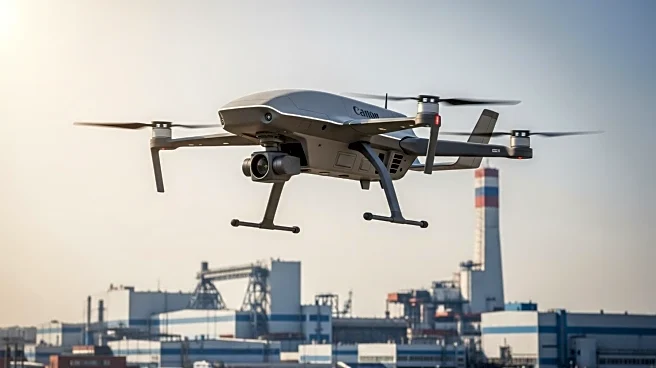What is the story about?
What's Happening?
Chinese drone experts have been working with Russian state-owned arms manufacturer IEMZ Kupol, which is under Western sanctions, to develop military drones. According to European security officials and documents reviewed by Reuters, these experts have visited Kupol multiple times since last year, contributing to the development of drones like the Garpiya-3. Kupol has received shipments of Chinese-made attack and surveillance drones through Russian intermediary TSK Vektor, also under U.S. and EU sanctions. The collaboration suggests a deepening relationship between Kupol and Chinese companies, with China’s foreign ministry denying any involvement in providing lethal weapons to parties in the Ukraine conflict.
Why It's Important?
The collaboration between Chinese drone experts and Russian arms manufacturers highlights the growing role of Chinese technology in Russia's military capabilities, particularly in the context of the ongoing conflict in Ukraine. This development could exacerbate tensions between China and Western nations, which have imposed sanctions on Russian defense entities. The involvement of Chinese companies in supplying drone technology to Russia may lead to further scrutiny and potential diplomatic repercussions, affecting international relations and trade dynamics. The use of drones in warfare has become increasingly significant, and this partnership could enhance Russia's military operations, impacting the geopolitical landscape.
What's Next?
The continued collaboration between Chinese and Russian entities in drone development may prompt further sanctions or diplomatic actions from Western countries. As the situation evolves, stakeholders such as the U.S. and EU may seek to tighten restrictions on technology transfers to Russia. Additionally, the development of new drone models by Kupol, with Chinese assistance, could lead to advancements in military technology, influencing future conflicts. Monitoring the response from international communities and potential shifts in alliances will be crucial in understanding the broader implications of this partnership.
Beyond the Headlines
The ethical implications of international collaborations in military technology, especially involving sanctioned entities, raise questions about accountability and the enforcement of global norms. The use of drones in warfare also poses challenges related to civilian safety and the rules of engagement. As technology continues to evolve, the legal frameworks governing its use in conflict zones may need to be reassessed to address emerging threats and ensure compliance with international humanitarian law.

















